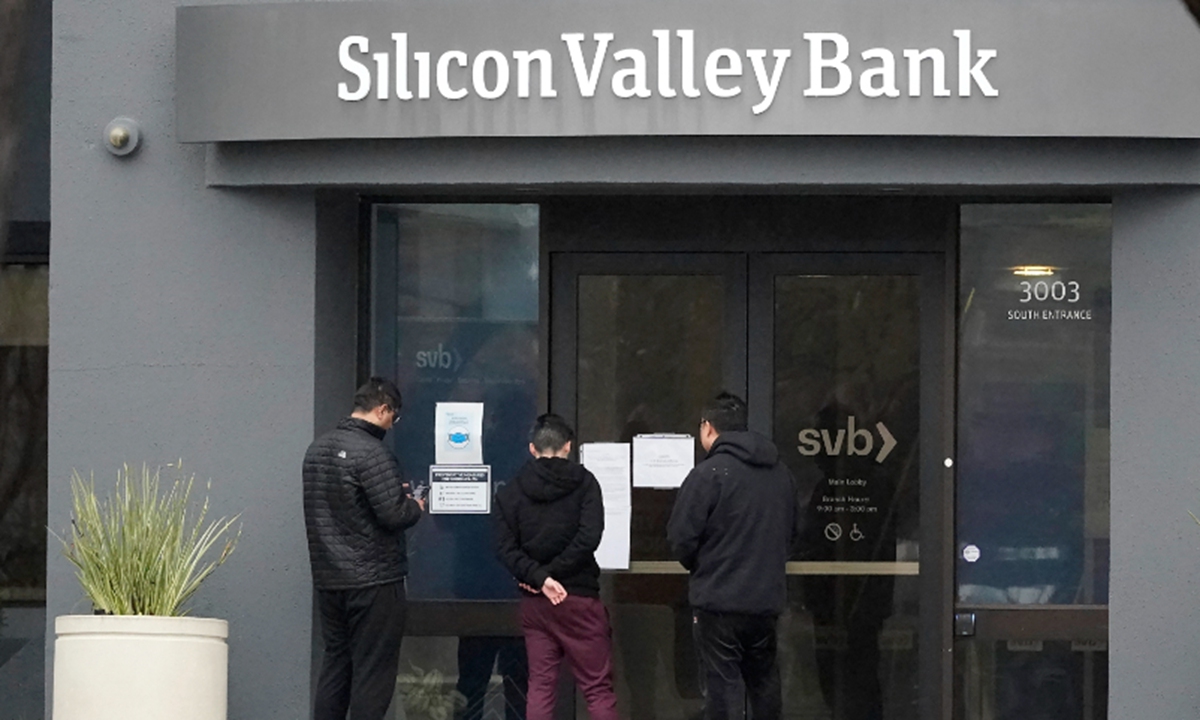Listed Chinese firms face ‘limited impact’ from SVB bankruptcy; experts warn of potential global financial turmoil

People look at signs posted outside of an entrance to Silicon Valley Bank in Santa Clara, California, on March 10, 2023. Photo: VCG
More than 20 listed Chinese companies said that Silicon Valley Bank (SVB)'s bankruptcy will have only a limited impact on their operations with their financials remaining on track, while their average deposits in SVB account for less than 5 percent of the total.
Analysts warned about uncertainty for Chinese depositors in the US, saying SVB's failure may trigger a domino effect as the US is likely to face another wave of bank failures with a potential economic crisis.
A-share listed Tianjin-based Andon Health Co said on Monday that its deposits with SVB accounted for about 5 percent of its total cash and financial assets as of Friday, while the rest of its dollar assets held in multiple institutions were unaffected. Andon will closely monitor the situation and transfer its deposits from SVB to other major financial institutions as soon as possible.
Chinese firms listed in the Hong Kong Special Administrative Region have also responded to the closure of SVB.
Zai Lab said that it had total cash and cash equivalents of approximately $1.01 billion as of December 31, 2022, while the amount held at SVB was immaterial, accounting for around 2.3 percent, with the bulk of its assets distributed across multiple institutions. SVB's closure will not have an impact on the company's ability to meet its operating expenses and capital expenditure requirements.
Several Chinese pharmaceutical firms issued statements stressing that the impact of SVB on their operations is limited.
Four science and technology companies said that they didn't have any deposits with SVB or the remaining balances were not a significant part of their overseas assets, the paper.cn reported on Monday.
For instance, Noah Holdings said that it has cash and cash equivalents of less than $1 million with SVB, representing less than 0.2 percent of the total.
The US Fed's continuous rate hikes are not effectively containing inflation, which could trigger a stock market crash, with SVB's fall being a warning sign of another potential wave of US bank failures, Dong Dengxin, director of the Finance and Securities Institute of the Wuhan University of Science and Technology, told the Global Times on Monday.
US authorities are taking steps to cope with the negative impact of SVB's failure and the market's reaction, but these measures haven't had an immediate effect, Dong said. He urged Chinese enterprises to seek third-party markets and bypass the US if possible when allocating assets overseas due to the uncertainty caused by market risks.
Chinese economist Ren Zeping noted in a report on Monday that China must be wary of overseas financial risks spilling over, and its self-development is the best foundation for risk prevention.
Ren said that SVB's failure could trigger global financial turmoil and even a recession if the Fed does not properly intervene.
The US Department of the Treasury, the Federal Reserve and the Federal Deposit Insurance Corp (FDIC) jointly issued a statement on Sunday (US time), saying that Secretary of the Treasury Janet Yellen approved actions enabling the FDIC to complete its resolution of SVB in a manner that fully protects all depositors.
According to the statement, depositors will have access to their money starting on Monday and no losses associated with the resolution of SVB will be borne by taxpayers.
The statement also announced the closure of Signature Bank in New York on Sunday by its state chartering authority over similar systemic risk issues. All depositors of the institution will be made whole while no losses will be borne by taxpayers.
The closure of the Signature Bank marks the third-largest failure in US banking history, according to media reports.
The Fed announced on the same day that it will make available additional funding to eligible depository institutions to help assure banks have the ability to meet the needs of all depositors. The Treasury will make available up to $25 billion from the Exchange Stabilization Fund as a backstop for a new Bank Term Funding Program, with the additional funding to be made available through the creation of the program.

